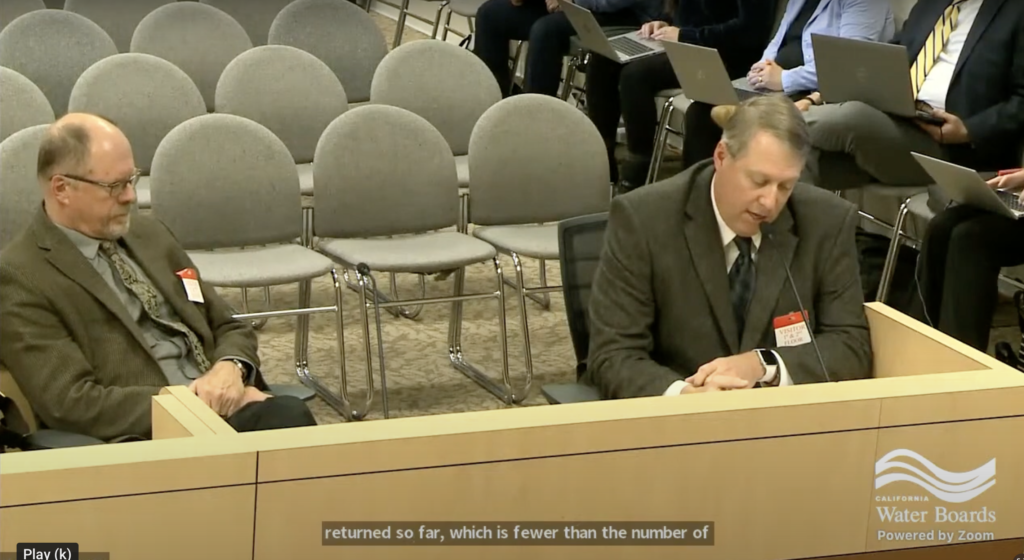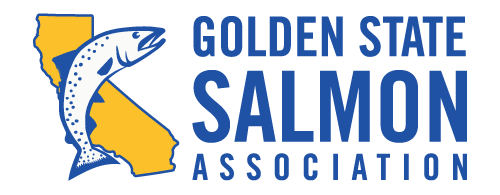Golden State Salmon Association organized a panel to testify before the State Water Resources Control Board in support of flow and temperature standards to protect Sacramento Valley salmon. GSSA Executive Director Scott Artis spoke about the broad impacts of the decline of Central Valley salmon and the 2023 season closure. He also described how the record setting adult returns this fall on the Mokelumne River, combined with the terrible returns on the Sacramento and its tributaries, demonstrate that water management, not drought, is responsible for the decline of Sacramento River salmon. Two GSSA board members, Sarah Bates, skipper of the San Francisco commercial boat Bounty and Jared Davis skipper of the party boat Salty Lady out of Sausalito, both testified about the impacts of the salmon closure on commercial and recreational fishing businesses. GSSA consultant Barry Nelson testified about the flaws in the staff’s analysis of the water users’ so called “voluntary agreements” proposal.
On December 11, the State Water Resources Control Board held its third public hearing on the Phase 2 Bay-Delta Water Quality Control Plan. Over the course of the three hearings, Golden State Salmon Association, partners, and members provided critical testimony – describing reprehensible and avoidable impacts to California’s salmon and fish stocks, the fishing industry and related businesses, Tribes, families and countless residents who rely on the Bay-Delta ecosystem. Golden State Salmon Association thanks everyone who participated in this critical process to restore healthy fish populations. Thank You! You can watch GSSA’s panel testimony here.

“Returns of adult fall-run spawning fish to the upper Sacramento Valley are dismal – very dismal – far below the target of 180,000 fish set for the 2022 fishing season. Educated guesses at this time put the number of total returning fall-run to the Sacramento Valley in the 70,000 to 90,000 range. That’s a slap in the face to every Californian and a punch to the gut for every commercial fisherman and woman, every charter boat operator, every river guide, and on and on,” Golden State Salmon Association’s Scott Artis told the State Water Board. “I’m tired of continued bad news for salmon. I’m heartbroken from the stories I hear from parents and business owners about their struggling children and spouses who are fishermen and women or industry employees who are out of work and struggling. A multi-billion-dollar industry with many tens of thousands of jobs are being put on notice. And it didn’t need to happen.”
“The document makes it very clear that the current VA (voluntary agreement) proposal does not even come close to adequately addressing the critical flow issues. There are many examples of that: virtually no dry year water, lower flows on the Sacramento River in critical years, delta water exports would increase in many years under the VAs, and in critical years Delta inflows could increase, but by as little as eight tenths of one percent. Those and many other examples show that the VA proposal, frankly, right now is not a serious, credible proposal when it comes to adequately protecting beneficial uses, particularly fish and wildlife and recreational and commercial fishing,” said Barry Nelson, Golden State Salmon Association, during panel testimony.
“The impact of the [2023 salmon fishing season] closure on the salmon industry is devastating,” said Richard Pool, Owner and CEO of Pro-Troll Fishing Products and GSSA Board Member. “Dozens of fishing stores have already closed their doors and 105 more are at risk of closing unless the Water Board provides relief.” Pool submitted a series of slides to the Water Board highlighting the impact to businesses like his that can be viewed here.
“As one of the 1,000 commercial salmon permit holders in California, I rely on these fish to feed my family and pay my bills. I am just one small fishing operation, but I am also a California small business that supports other California small businesses. I am coastal communities from Morro Bay to Crescent City. I am local food security and I am deeply sad to be witnessing what may be the final days of a species that has been moving through the Golden Gate and Sacramento delta since before humans started walking on 2 legs,” Sarah Bates, San Francisco commercial fishing vessel owner/operator and GSSA Board Member testified at the hearing on December 1.
“A complete closure of our Salmon season has directly hobbled my ability to maintain a viable business. Trips, customers carried and revenue are down 80% for me overall, and obviously 100% for Salmon fishing,” said Jared Davis, owner/operator of Salty Lady Sportfishing and GSSA Board Member. “It is painfully obvious that this closure is a direct result of inadequate temperature and flow in our rivers to support the life cycle of the iconic Salmon. The irony of an administration that touts its focus on the green agenda and environmental policy – being behind water policy that is killing Salmon along with our rivers and the whole San Francisco Bay/Delta estuary ecosystem is staggering.”
The State Water Board is considering several possible approaches to reversing the decline of salmon and the Bay-Delta ecosystem, as they update the Board’s current failed standards, which were adopted in 1995. The first option is an “unimpaired flow” approach, which would require a certain percentage of natural flow to be allowed to flow down Central Valley rivers and through the Delta. This approach would mimic the natural hydrographic, which salmon are adapted to. GSSA supports this approach, and believes that a standard requiring 65% of unimpaired flow from January to June, combined with temperature protections at major Central Valley reservoirs like Shasta and Oroville, could help restore Central Valley salmon. The Board is also considering a water user proposal called the “voluntary agreements” – a package of habitat restoration and very small flow improvements. Prior to GSSA’s panel, a panel of scientists working for environmental groups summarized the science supporting the 65% unimpaired flow approach, as well as the lack of any scientific support for the Voluntary Agreement approach.
The Board will accept written testimony and comments through January on its draft document regarding new Sacramento Valley and Bay-Delta flow standards, and revise that proposal during 2024.
